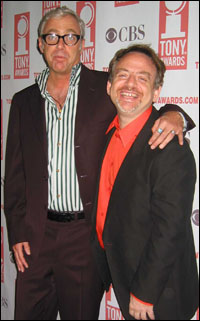
*
The die was cast by age 13, when Scott Wittman's parents gave him a choice: "To see Hair, or Golden Rainbow with Steve and Eydie?" He chose Golden Rainbow, and "that made all the difference," he says.
He beams proudly, having racked up a few decades crafting acts for everyone from Edie Beale to the actress who won a Tony playing Edie Beale, Christine Ebersole in Grey Gardens.
Marc Shaiman entered the fray of periphery showbiz at 17 as vocal arranger, then musical director, for Bette Midler, eventually venturing into film scoring ("A Few Good Men," "The Addams Family," "Sister Act" and many more).
Their worlds converged one afternoon in 1976 at Marie's Crisis, a subterranean show-tune haunt in the West Village. A barkeep, sweeping up, noticed Shaiman tickling the ivories expertly and bolted upstairs to tell Wittman, who at the time was directing a nightclub act at the Duplex and saddled with a pianist who sounded as if he "played with his mittens on." "It was a Warner Brothers 'meet-cute' [moment]," Wittman recalls. "That was 35 years ago," follows up Shaiman. "We've been a couple for 32 years."
And they've been Broadway tunesmiths for over a decade, grabbing a Tony for Best Score for Hairspray in 2002. They sealed that deal, famously, with the first nationally televised Tony-night same-sex kiss since — well, since Harvey Fierstein previously won Best Actor (in Torch Song Trilogy 20 years before).
Now the boys are at it again in anticipation of their third Main Stem outing together, Catch Me If You Can, opening April 10 at their old Hairspray hangout, the Neil Simon Theatre. "I remember backstage at the Tonys that night was the first time we said that title out loud," says Shaiman. "When people hear we've been working on this show for eight years now, I fear they're going to think it's like the Ring cycle."
| |
 |
|
| Wittman and Shaiman in 2003. | ||
| photo by Aubrey Reuben |
Now, the creatives above — and other Hairspray cohorts (costume designer William Ivey Long, set designer David Rockwell, lighting designer Kenneth Posner) — are finally in alignment and focused on musicalizing Steven Spielberg's 2002 fact-based film comedy about Frank Abagnale, Jr., a slick, silver-tongued fraudster who, impersonating a Pam Am pilot, a pediatrician and a lawyer, bounced about the globe blithely strewing 2.8 million dollars' worth of bad checks — all before his 21st birthday.
Wittman was the first to see a musical in the above. "I was attracted to the imagery initially," he says. "Then, as I watched it, I realized it spoke to things I wanted to write about and I knew Marc wanted to write about: the notion of family and, when yours doesn't work, you create another one outside of it. It's about fathers and mentors and stewardesses — all those things are floating about. We have, I must say, ten of the most beautiful girls on Broadway."
Fabricating a new family is, to Shaiman, "the foundation of what the show is about — about this detective realizing, 'If I don't step up to parent this kid, no one will' — and also realizing he has that in him, that he doesn't have to see everyone he chases as a criminal but as a human being. Something about this kid touches and changes him."
The sound is '60s again, "a few years down the road from Hairspray," Shaiman notes. "It's more adult and sexy. Hairspray was completely innocent and more girlie.... It's a very male-driven kind of score because the principals — Frank, Frank's father and the detective — are men. If Hairspray was Sixteen magazine, Catch Me If You Can is Playboy."
Aaron Tveit is the slippery teen con leading the chase, and Tony winner Norbert Leo Butz plays the Javert in dogged pursuit, agent Carl Hanratty. The guy left at the starting gate of this chase is Frank, Sr., himself a lower-case crook; the part, played here by Tom Wopat, earned Christopher Walken an Oscar nomination.
"When Christopher did the Hairspray movie, I'd talk to him about the character [Frank, Sr.]," Wittman remembers. "He told me a story I kept in my mind when we were writing the character. Picasso's father was a painter in his own right, but once he saw Picasso paint, he threw all his brushes away. That's what happened to this father. He was a schemer and a dreamer, but he saw his son was better at it. It was hard for him to take — he lost so much in the process of that."











